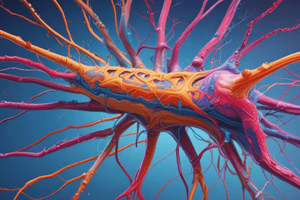Podcast
Questions and Answers
Why are action potentials not decremental in nature?
Why are action potentials not decremental in nature?
- Because the action potential is initiated at one end of the neuron and propagates towards the other end
- Because the action potential is initiated at the middle of the cell and propagates towards the ends
- Because the action potential can propagate in either direction along the membrane
- Because the action potential depends on the positive feedback cycle of a new group of Na+ channels (correct)
What is the main reason action potentials can only propagate in one direction along a membrane?
What is the main reason action potentials can only propagate in one direction along a membrane?
- Because the action potential is initiated near the middle of the skeletal muscle cells and propagates towards the two ends
- Because the velocity of propagation depends on the fiber diameter and whether the fiber is myelinated
- Because the action potential is initiated at one end of the neuron and propagates towards the other end
- Because the membrane area that has just undergone an action potential is refractory and cannot immediately undergo another (correct)
What is the relationship between the velocity of action potential propagation and the fiber diameter?
What is the relationship between the velocity of action potential propagation and the fiber diameter?
- The smaller the fiber diameter, the faster the action potential propagates
- The velocity of action potential propagation depends only on whether the fiber is myelinated, not on the fiber diameter
- The larger the fiber diameter, the faster the action potential propagates (correct)
- The fiber diameter has no effect on the velocity of action potential propagation
Under what condition can action potentials propagate in either direction along an excitable membrane?
Under what condition can action potentials propagate in either direction along an excitable membrane?
Where are action potentials typically initiated in most neurons?
Where are action potentials typically initiated in most neurons?
What happens to the action potential when it reaches the end of an axon?
What happens to the action potential when it reaches the end of an axon?
What is the term used to describe the stimuli that cause subthreshold potentials?
What is the term used to describe the stimuli that cause subthreshold potentials?
According to the all-or-none law, what is true about action potentials?
According to the all-or-none law, what is true about action potentials?
What happens during the absolute refractory period of an action potential?
What happens during the absolute refractory period of an action potential?
What is the effect of anesthetics on nerve cells?
What is the effect of anesthetics on nerve cells?
What is the relationship between the amplitude of an action potential and the stimulus intensity?
What is the relationship between the amplitude of an action potential and the stimulus intensity?
What is the purpose of the refractory period in the generation of action potentials?
What is the purpose of the refractory period in the generation of action potentials?
What is the primary reason that voltage-gated Na+ channels open before voltage-gated K+ channels during membrane depolarization?
What is the primary reason that voltage-gated Na+ channels open before voltage-gated K+ channels during membrane depolarization?
What is the primary function of the inactivation gate in voltage-gated Na+ channels?
What is the primary function of the inactivation gate in voltage-gated Na+ channels?
Which of the following is a key difference between voltage-gated Na+ and K+ channels during the action potential?
Which of the following is a key difference between voltage-gated Na+ and K+ channels during the action potential?
What is the purpose of the refractory period during an action potential?
What is the purpose of the refractory period during an action potential?
What is the significance of the 'all-or-none' law in the context of action potentials?
What is the significance of the 'all-or-none' law in the context of action potentials?
What is the relationship between subthreshold potentials and the generation of an action potential?
What is the relationship between subthreshold potentials and the generation of an action potential?
Flashcards are hidden until you start studying



